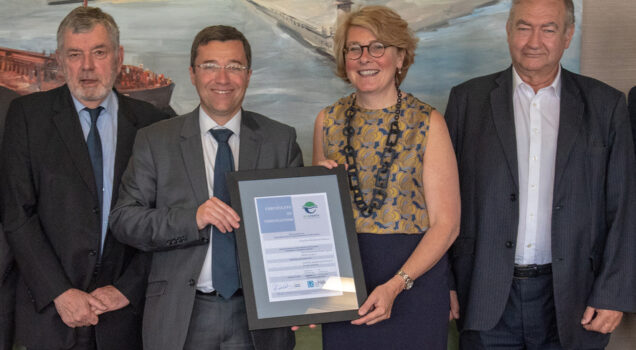DUNKERQUE-PORT GAINS “PERS” CERTIFICATION FROM EcoPorts NETWORK

In line with the commitments of the PA2D (Sustainable Development and Action Plan), Dunkerque-Port has just received the EcoPorts network’s PERS certification (Port Environmental Review System), granted by the ESPO (European Sea Ports Organisation).

This environmental management certification, specific to the port sector, attests to correct compliance with current rules and standards, and rewards involvement in projects and initiatives for better environmental performance in ports.
This European recognition also stresses the environmental and innovative actions that have been carried out by Dunkerque-Port for nearly ten years as part of its activities. Purposeful and often unprecedented initiatives have emerged in favour of sustainable development: optimised management of dredging sediment (Dredging Master Plan), improvement in quality of port water (Sewerage Master Plan), consideration of biodiversity upstream of development projects (Natural Heritage Master Plan), collection of waste from ships, knowledge and management of the coastline, greenhouse gas inventory, and soon the opening of a Port Centre.
Environmental conservation thus entails the implementation of proactive policies integrating the environmental issues related to all the port’s activities. This specific know-how of Dunkerque-Port, thanks to responsible planning and a policy of continuous progress, is now fully recognised.
So, following the renewal of its ISO 9001 certification (since 2009), the PERS demonstrates Dunkerque-Port’s determination to continue developing its activities through efficient and responsible environmental management. The exemplary approach followed in accordance with of the PA2D, the 2014-2018 Strategic Plan and the Quality, Safety and Environment Policy, stands as the framework for the port’s new Environmental Policy.
The PERS will prove to be an effective tool, complementing Dunkerque-Port’s other planning tools, and creating with them a firm basis for the CAP 2020 project (project for a new dock and new infrastructures for the container sector at Dunkirk) to limit its environmental impact through the definition of concrete solutions.
Dunkirk thus joins the restricted network of the 33 PERS-certified ports among the 94 European and Mediterranean ports awarded the EcoPorts label, notably alongside the port of Calais.
For the record, in 2016 Dunkerque-Port was a winner at the ESPO Awards on the theme of “Nature in ports”. The ESPO had already recognised the proactive dynamic of the port of Dunkirk in terms of conservation of the natural heritage in its district.The PERS is awarded to ports after submission of a detailed report to Lloyd’s Register. It is valid for two years.

